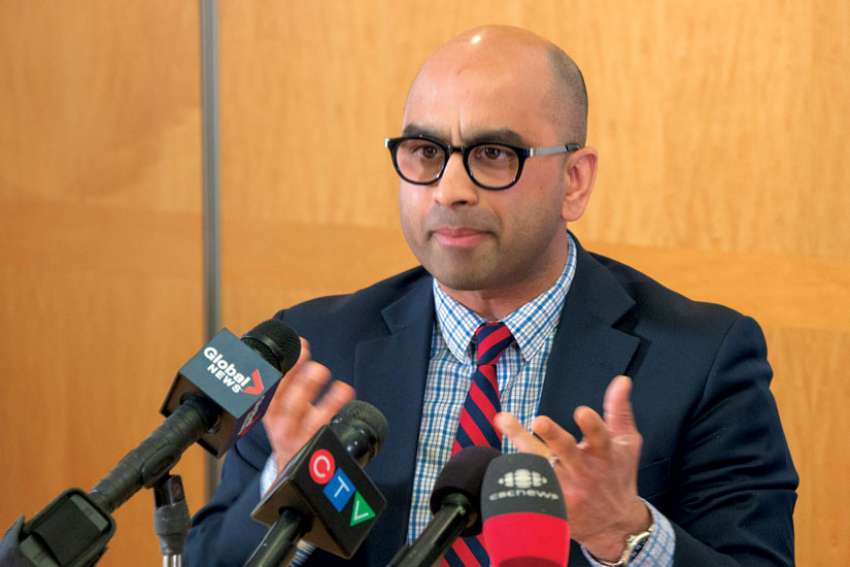At the University of St. Michael’s College, principal and vice president Randy Boyagoda describes his college at the University of Toronto as “seriously Catholic and thoughtfully secular.”
St. Michael’s is a “platform and a venue” for all students to live their faith in a religiously serious way, even if they’re not Catholic, Boyagoda told The Catholic Register. For the many hijab-wearing, serious and publicly committed Muslim women in the St. Mike’s student body, they know their religious insights and convictions will be taken seriously at the Catholic college because so many Catholics on campus take their own tradition, ideas and convictions seriously.
Because St. Michael’s is a private, Catholic university affiliated with a big, public, secular university it’s unlike anything else in North America, said Boyagoda.
“You can be part of a Catholic community (at St. Mike’s) where the search for the true and the beautiful, the call to social justice, share the same source and summit — where our highest aspirations as individuals are recognized for what they are, which is to say vocational callings,” he said. “And all of this can be done in a confident, joyful, cosmopolitan way that both benefits from and benefits for this great, big, giant, remarkable research university across Queen’s Park. That’s the vision.”
For Catholics, their universities are where the Church does its thinking, said Vancouver Archbishop Michael Miller.
Miller spent the mid-1990s in Rome as secretary to the Vatican’s Congregation for Catholic Education just when the Holy See was trying to get Catholic universities around the world to sign onto specific commitments to Catholic doctrine under the apostolic constitution called Ex Corde Ecclesiae (Out of the heart of the Church). Particularly in North America, the constitution was regarded with suspicion as an instrument of control — a limit on academic freedom.
But academic freedom is not freedom if it doesn’t include the freedom to be who you really are. In Catholic understanding, academic freedom is not the exclusive property of individual professors or students. It also belongs as well to Catholic institutions that need to be free to be true to their Catholic intellectual tradition — to be who they are.
Catholics need Catholic universities because they need to “think about things in the areas of theology or religion, the faith and ethics with the same degree of sophistication as they do about things in their professional life,” said Miller.
“To me a Catholic university, when it’s a Catholic university, it’s able to provide a way of thinking about questions that we have, both individually and socially — to think about them in a sophisticated and adult way in the light of the Gospel, in the light of Church teaching,” he said. “If we don’t have that, we’re often stuck with tools that are appropriate to catechesis and a younger stage of intellectual development.”
Boyagoda warns against intellectual escapism when defining Catholic higher education.
“Our defaults are very easy and very tempting,” he said. “The one is the ideological default, where we’re more Catholic than a university. The other default is to say ‘We’re not Catholic at all, we’re just open to spirituality.’ Neither of those, frankly, is appealing to an 18-year-old, never mind a serious scholar.”
The real Catholic university is confident, joyful, cosmopolitan and open to any and every debate because it knows what it is and why it exists, Boyagoda said. If people want to debate, research and explore abortion, euthanasia, gender politics — all the hot-button issues — where better than at a Catholic university?
“The hard stuff is when it comes to the beginnings and ends — abortion, euthanasia; when it comes to questions related to evolutionary biology, human sexuality. There’s a reality there which is that the Church has a far more subtle reality to it than most people give us credit for. But there are also some pretty hard and fast positions that the Catholic Church holds,” he said.
“How does all of that play out in the context of a university? And specifically in the context of academic freedom? Should we be discussing these things in classes? Absolutely. Absolutely we should. Should we make it possible for our students to speak out about these things in class? Absolutely. Should we be confident on both sides of these questions that whatever comes up in class we can sustain, respond to and engage? Absolutely.”
All Catholic education is an exercise in discovering and acquiring freedom, said St. Michael’s theology professor Fr. Mario D’Souza.
“In ultimate terms, education is about freedom — the personal freedom of the student,” said D’Souza.
For those with a purely materialist viewpoint, it’s hard to really know the dimensions of freedom Catholics seek at university, said the philosopher of education and Basilian priest.
“If you rely only on sensory knowledge, you’re not going to get it,” he said. “We have to become reflective, self-reflective people. And say — not just as a Catholic or a Christian, but as a human being — ‘How am I primarily defined and shaped by meaning and value I give my life and therefore give other people?’ That’s what’s going to be able to free me.”
Like many in Catholic higher education, D’Souza worries about the elevation of science, engineering, economics and career-oriented fields at the expense of liberal arts, the humanities and fields of study that are specifically about meaning, value and the deepest explorations of human experience.
“That just reduces us to one-dimensional beings,” he said.
Rather than sitting in front of another screen, absorbing information, a Catholic education is the result of human relationships, said D’Souza.
“It requires a teacher, a professor, in the same room with the students, speaking to them, judging their reactions. In a good, humanistic sense, and even in a Catholic sense, a computer will never be able to take the role of the teacher.”


